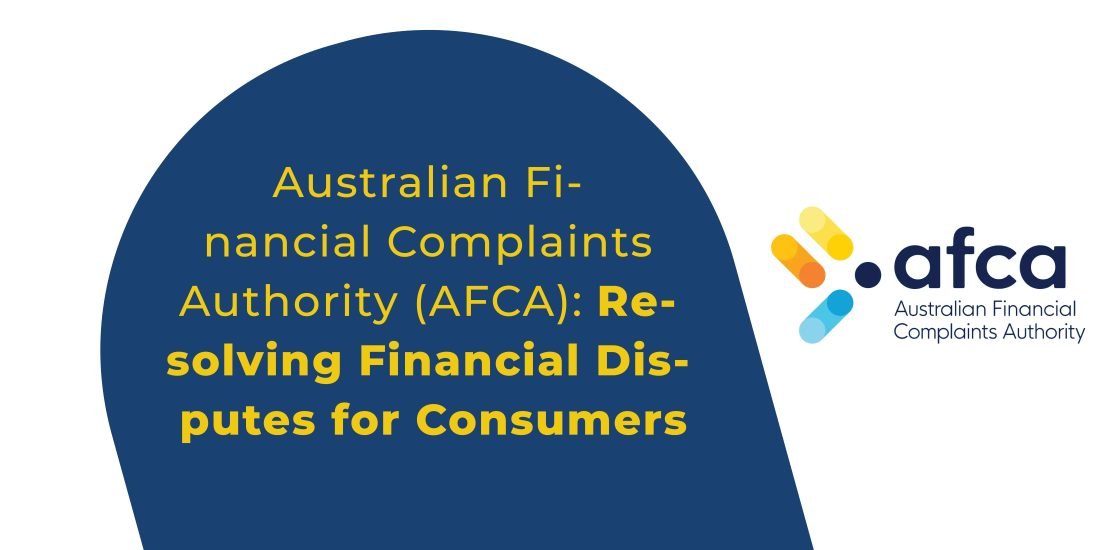- June 14, 2023
- Posted by: mararting
- Category: License

The Australian Financial Complaints Authority (AFCA) is an independent and impartial external dispute resolution scheme established to resolve complaints between consumers and financial services providers. As a key part of the Australian financial regulatory framework, AFCA provides a fair and accessible avenue for individuals and small businesses to seek resolutions for a wide range of financial disputes. In this article, we will explore the role and benefits of AFCA, its dispute resolution process, and how it contributes to consumer protection and the maintenance of trust in the financial sector.
Understanding AFCA
AFCA was established in November 2018 as a merger of several previous dispute resolution schemes, including the Financial Ombudsman Service (FOS), the Credit and Investments Ombudsman (CIO), and the Superannuation Complaints Tribunal (SCT). This consolidation aimed to provide a streamlined and efficient process for resolving financial complaints.
AFCA’s jurisdiction covers various financial services and products, including banking, insurance, superannuation, investments, credit, and payment systems. It handles complaints from individuals, small businesses, and certain charities and not-for-profit organizations.
Jurisdiction and Coverage
AFCA has jurisdiction over a wide range of financial products and services, including banking, credit, insurance, investments, superannuation, and payment systems. This broad coverage ensures that consumers have a single point of contact for resolving various types of financial disputes.
Independent and Impartial
AFCA operates independently from the financial services industry, ensuring that its decisions and determinations are impartial and unbiased. It is not influenced by any particular stakeholder or financial institution, allowing for a fair and objective resolution process.
Enhanced Powers and Remedies
AFCA has been granted expanded powers and increased monetary limits compared to its predecessor schemes. It can make binding decisions on disputes involving compensation up to certain monetary thresholds. This empowers AFCA to provide meaningful remedies to consumers who have suffered financial loss or detriment.
The Dispute Resolution Process
AFCA offers a straightforward and accessible dispute resolution process that aims to resolve complaints efficiently and fairly. The process involves several steps:
a) Initial contact and eligibility assessment: Consumers must first contact AFCA to determine if their complaint falls within its jurisdiction. AFCA’s website and customer service team provide guidance on the types of disputes it can handle.
b) Informal resolution: AFCA encourages parties to resolve complaints directly and informally with the financial services provider before involving AFCA. If the complaint remains unresolved, the consumer can proceed with formal dispute resolution.
c) Lodging a formal complaint: Consumers can lodge a complaint online or by mail, providing details of the dispute, supporting documents, and any relevant communication with the financial services provider.
d) Case management and investigation: AFCA assigns a case manager who acts as a single point of contact throughout the process. The case manager reviews the complaint, gathers information from both parties, and conducts an independent investigation.
e) Mediation and negotiation: AFCA encourages parties to engage in mediation and negotiation to reach a mutually agreeable resolution. Trained AFCA conciliators facilitate discussions between the parties to find a fair outcome.
f) Determination and binding decisions: If mediation fails or is not appropriate, AFCA’s independent panel makes a determination based on the evidence presented. The determination is binding on the financial services provider, but the consumer has the option to reject it and pursue other legal avenues.
g) Implementation and compliance: Once a determination is accepted, the financial services provider must comply with the decision, including any compensation or remedies ordered by AFCA.
Fast and Efficient Resolution
AFCA is committed to resolving disputes in a timely manner. The organization sets strict timeframes for the resolution process, ensuring that complaints are addressed promptly. AFCA’s streamlined approach helps expedite the resolution process and provides consumers with a quicker outcome compared to traditional legal avenues.
Focus on Consumer Experience
AFCA places a strong emphasis on the consumer experience throughout the dispute resolution process. It is committed to providing clear communication, support, and guidance to consumers at every stage. AFCA’s website offers user-friendly resources, including information on rights and responsibilities, frequently asked questions, and case studies, to help consumers navigate the complaints process.
Expert Panel Members and Case Managers
AFCA’s panel members and case managers possess extensive expertise in various financial areas. They bring specialized knowledge to the resolution process, allowing for a thorough understanding of complex financial disputes. The expertise of panel members and case managers ensures informed decision-making and enhances the credibility of AFCA’s determinations.
Consumer Protection and Benefits
AFCA provides significant benefits to consumers and enhances consumer protection in the financial sector:
a) Accessibility and convenience: AFCA’s dispute resolution process is designed to be accessible and user-friendly, with online lodgment options and support available to individuals who may face barriers to participating in the process.
b) Fairness and impartiality: AFCA’s independence and impartiality ensure that complaints are resolved fairly, providing consumers with an unbiased resolution process.
c) Expertise and specialized knowledge: AFCA’s panel members and case managers possess expertise in various financial areas, enabling them to understand complex financial disputes and make informed decisions.
d) Cost-effective alternative to legal proceedings: AFCA’s services are free for consumers, making it an affordable alternative to costly legal proceedings for resolving financial disputes.
e) Efficient resolution process: AFCA aims to resolve complaints in a timely manner, providing consumers with a faster resolution compared to traditional legal processes.
f) Binding decisions: AFCA’s determinations are binding on financial services providers, ensuring that consumers receive appropriate compensation or remedies as ordered.
Continuous Improvement and Accountability
AFCA is committed to continuous improvement and learning from its experiences. It actively seeks feedback from consumers, financial services providers, and other stakeholders to refine its processes and address any areas for improvement. AFCA also undergoes regular external reviews and audits to ensure accountability and adherence to best practices.
Collaboration with Regulators and Industry
AFCA collaborates with regulatory bodies such as ASIC and the Australian Prudential Regulation Authority (APRA) to address systemic issues and promote better outcomes for consumers. It works closely with industry stakeholders to encourage compliance with regulations and foster industry-wide improvements in customer service and complaint handling.
The Australian Financial Complaints Authority (AFCA) plays a crucial role in resolving financial disputes and providing a fair and accessible avenue for consumers to seek resolution. By offering a streamlined and impartial dispute resolution process, AFCA contributes to consumer protection and trust in the financial sector. Its expertise, binding decisions, and cost-effective approach make it an essential part of Australia’s financial regulatory framework. AFCA’s commitment to fairness, accessibility, and efficient resolution of complaints helps ensure that consumers have a voice and can seek redress when facing issues with financial services providers.
